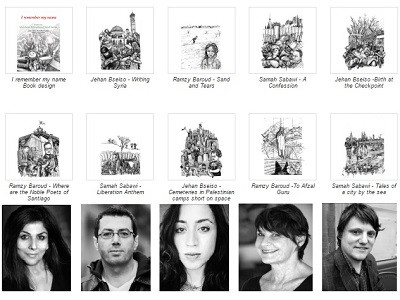
Reviewed by Stuart Rees
(Vacy Vlazna, ed., I remember my name – Poetry by Samah Sabawi, Ramzy Baroud, Jehan Bseiso. Novum Publishing, 2016)
Poetry’s Panacea
Conditions on the West Bank, in Gaza, in East Jerusalem and in myriad Palestinian refugee camps are monstrous. What non-violent response can there be to the violence and hatred, the killings and the dispossession, the endlessly cruel siege of Gaza, the thuggery of settlers and the Netanyahu rants?
As if taking their cue from the English poet Shelley who said that poets were the unacknowledged legislators of the world, three Palestinian poets have crafted an inspiring and empowering response.
In the anthology, I remember my name, Samah Sabawi, Ramzy Baroud and Jehan Bseiso give the antidote to violence and stimulants to combat despair.
Ramzy Baroud displays an immediate clue to as to the essence of their panacea, ‘When words fail me I resort to poetry’. In La cafet he also reveals, ‘I seek solace in Forgetfulness, bleeding heart, faking a smile.’
In lines from Statuses and Headlines, satirist Samah Sabawi mocks, ‘War on terror, war of terror, war for terror.’
Jehan Bseiso conjures optimism from Everyday Nakba. ‘Each year marks death, dispossession and occupation but also birth, and the celebration of memories and resistance.’
A Means Of Liberation
Here is a refuge which stores the story of Palestine, the bestial-like collective punishment of the people of Gaza and the international community’s collusion with such cruelty. Yet from the carnage you sense that these poets might save Palestine, even the world. In her Liberation Anthem, the passionate Samah writes, ’To the people of Israel who fear our freedom, Don’t be afraid, we will liberate you too.’ Later she assures Israelis, ‘You and I are no different, We are made of blood and tears.’
Almost in the same breath but in another poem, Verses and Spices Samah acknowledges the influence of her father, the celebrated but exiled Gazan poet Abdul Karim Sabawi: ‘Growing up, my father’s poems ran through my veins like blood, A necessary life ingredient, A rhythm that kept my heart pumping.’ Lines from her poem Words should jolt any reader: ‘Without naming the crimes they commit, without saying Ethnic Cleansing and Apartheid, Your words ring hollow.’
Ramzy links the suffering of Gazans to a wider world where violence is considered the only way to solve problems. His cosmopolitan perspectives show in his insistence that resistance to oppression has to be universal: ‘My fist will rise from the charred earth, In a painting by Naji Ali, Through the thick walls of the Louisiana State Penitentiary, In the streets of Hanoi, Amid the rubble of a Gazan mosque.’
In her Brainstorming Naqba, Jehan explains why for decades it has been difficult for Palestinians to be understood in a world too easily influenced by American, European and Australian politicians brainwashed by the Israeli narrative and by an international media fascinated by massacres in another country or embedded in another war. Jehan writes, ‘We are bastard children of hyphens and supplements in sentences that start with, Originally I’m from…We read Kanafini, Darwiche and Said, When we found tongues, we learned to speak from the margins of pages.’
But in Birth At A Checkpoint, Jehan’s defiance and life-enhancing irony show: ‘Israeli soldier puts his weapon down to help Um Ali spread her legs, her face is red with shame, her husband is waiting at home in Abu Dis, He doesn’t have the right pages with the blue and white stamps, he can’t cross to Jerusalem…The international community is having 9 course dinners in the Alps.’
Optimism For The Future
It is a fillip to one’s spirits to witness optimism against overwhelming odds. In editing this volume Vacy Vlazna has not only orchestrated three poets but also shows her disbelief about cruelty and her record of always protesting injustice. In common with the German poet and playwright Bertolt Brecht, Vacy knows that ‘Justice is the bread of the people’, and that daily justice is as necessary as daily bread.
In Open Your Eyes, Ramzy provides a hopeful contrast to the monstrous racism and violence of current Israeli government policies. In the last of six verses from that poem he writes, ‘O Sun, Cast a strange hue, New kind world, A curious rhyme, Friends waiting, An empty chair, The horizon.’
In Tales of a City by the Sea, Samah reminds us why Gaza must survive and why the people will be free. ‘There is no limit to the sea’s audacity. It breaks the siege everyday, one defiant wave at a time.’
In diverse figures of speech poetry can spark imagination, raise hopes, tell the meaning of freedom and the means of achieving such a goal. On that journey, Editor Dr.Vacy Vlazna and the book’s talented illustrator David Borrington have combined to showcase three significant Palestinian poets.
– For more information click here. Order the book from the publisher; from Amazon. Click here to order from Australia.
– Stuart Rees is Professor Emeritus of the University of Sydney and Founder of the Sydney Peace Foundation. He is the former Director of the Sydney Peace Foundation (1998-2011) and of the Center for Peace and Conflict Studies (1988-2008), and a Professor of Social Work (1978-2000) at the University of Sydney. Visit: Sydney Peace Foundation. (This review was first published in On Line Opinion.)




